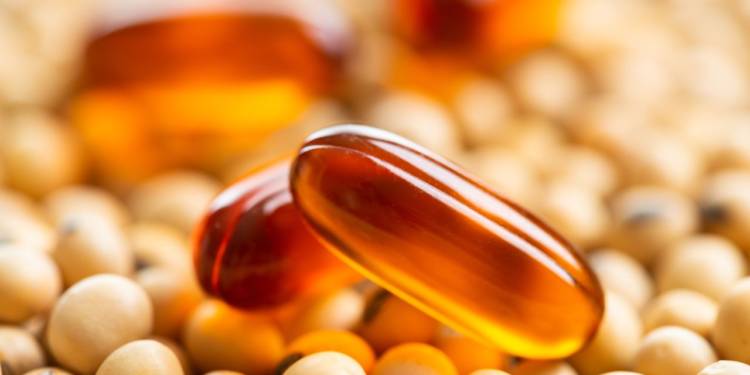Rumour has it that lecithin is claimed to be effective for weight loss, but is it hundred percent true? We are afraid it is not so! Here we talk about lecithin and how it helps in weight loss (even if it does marginally). Also, we delve into the benefits and side effects of lecithin, other components which help in weight loss, and much more. Let’s first understand what exactly lecithin is.
Lecithin: An Overview
Lecithin is an emulsifier widely used in the food industry. It is a mix of fats that are essential for human cells. Lecithin also finds its usage in the pharmaceutical and cosmetic industry. An emulsifier mixes two ingredients that generally cannot mix well. For example, water and oil can be mixed and made as one liquid with the help of lecithin. It is therefore popular as a food additive.
Lecithin has phospholipids. It is probably responsible for its health benefits. Its structure has a water-loving side known as the hydrophilic side and a chemically water-repelling side known as the hydrophobic side. Due to its distinct property, lecithin can combine two immiscible liquids like oil and water.
Sources of Lecithin
Dietary sources of lecithin are in the following food products: –
- Soybean and its products
- Seeds like sunflower, canola, cotton seeds etc.
- Egg particularly in the yolk
- Red meat
- Organ meat
- Legumes like black beans, kidney beans
- Peanuts
- Wheat germ
- Whole grains
- Fish and other seafood
- Brussels sprouts, broccoli and some cooked foods
Lecithin and Weight Loss: The Mechanism
Lecithin has a compound known as phosphatidylcholine. This compound is a precursor to the nutrient choline. In addition, phosphatidylcholine makes up for 3% of lecithin. This 3% is the wonder component that helps in weight loss.
When we consume lecithin, phosphatidylcholine gets converted to the nutrient choline in our body. Also, choline helps in rapid weight loss, as seen in a study. It has a similar structure to the complex vitamin B family and helps the body in fat burning. Choline is present in various foods, and RDA groups it alongside the B vitamins. In addition, choline helps produce a neurotransmitter called acetylcholine. It is released in the brain and at neuromuscular junctions.
Acetylcholine is involved in various physiological processes, including cell membrane structural integrity and signalling. It is a significant source of methyl groups through its metabolite and acetylcholine synthesis. Low levels of acetylcholine in the neurological system can play a role in fatigue development. However, the use of choline to mainly lose weight is still under extensive research.
Choline is necessary for fat metabolism; it breaks down fat as an energy source and helps in the emulsification of fat in the body like cholesterol. It prevents the storage of fat, aiding in weight loss. Choline’s activity makes it helpful in preventing disorders like fatty liver and blood fat accumulation. Choline’s efficient fat metabolism relates to higher satiety levels. In other words, satiety is attained faster while consuming choline.
Higher satiety levels lead to decreased calorie consumption and therefore l weight loss. For example, according to a study, adding choline-rich eggs to breakfast helped obese people on a low-fat diet lose weight more effectively than eating the same number of calories on a bagel in the morning.
Benefits of Lecithin
Apart from aiding in weight loss to some extent, lecithin has other benefits, which are as follows:
Lowers Cholesterol:
The most well-known advantage is the potential of lecithin to decrease cholesterol. According to research, lecithin helps raise HDL (good) cholesterol while decreasing bad cholesterol (LDL) in blood profiles.
Helps in Problem-Free Breastfeeding for Lactating Mothers:
Clogged nipples are a significant concern for lactating mothers. This problem is solved by lecithin as it liquefies the milk and unclogs the nipples, helping a regular milk flow. However, this is not a remedy for clogged ducts. Instead, one can use warm compresses to treat ducts or massage the area. You should always take help from a medical expert if the problem persists.
Improves Heart Health:
Soy-derived Lecithin can help improve cardiovascular health, particularly if you’re already at risk for cardiovascular diseases or elevated blood pressure.
Enhances Memory:
Choline, a substance used by the brain to communicate, is found in lecithin. Therefore, a choline-rich diet can improve memory and benefit those with Alzheimer’s disease. In addition, choline-containing lipids, such as lecithin, may help the brain’s functioning circuits. Although there is some conflicting information about whether lecithin can treat patients with psychological disorders, research findings are promising and progressing.
Improves Digestion:
Lecithin, in case of ulcerative colitis, helps with digestion. The emulsifying properties of lecithin result in a chain reaction that enhances the mucus in your colon, making digestion easier and protecting your digestive system’s sensitive lining, as per a study.
Good for the Skin:
Many dermatological products contain lecithin as an ingredient. It works as an emollient, providing hydration to the skin and making it feel smooth. The type of lecithin utilised in most of these products is hydrogenated lecithin. Although some use lecithin to treat acne and eczema, there isn’t much proof that it can do so independently. In addition, the fact that taking lecithin capsules will help your skin is not inevitable.
Possible Side Effects of Lecithin
You should consult a doctor if you are expecting, before taking lecithin. For example, if you have an allergy to egg or meat, you might not want to include any lecithin rich food source in your diet.
Some common side effects of lecithin are:
- Vomiting or nausea
- Loose stools
- Early satiety
- Upset stomach
Please note if you have irritable bowel syndrome, you might not want to take any rich source of lecithin. It has side effects, including an upset stomach.
Other Components Essential for Weight Loss
Fibre
Taking Fibre Rich Foods plays a vital role in reaching early satiety and helps in weight loss. Good sources of fibre are whole grains, millets, multi-grains and multi millet food products. You should also include whole fruits and vegetables in your diet for weight loss.
Portion Size
If you try to cut down your portion size, you will see a positive effect of weight loss on your body.
Physical Activity
It leads to toning and well-structured muscles. We burn fat when we work out, leading to weight loss. Regular physical activity helps in weight loss.
Hydration
Good water intake is essential for weight loss. It helps flush out toxins from the body, resulting in a healthier body and aiding in weight loss.
Create a Relaxed Environment
A stressed environment leads to weight gain. It increases the possibility of binge eating. A relaxed environment, on the other hand, helps in weight loss.
Sleep
Good and optimum sleep helps in weight loss. Lack of sleep helps in lowered metabolism, which increases weight. Good sleep enhances metabolic rate and aids in weight loss.
The Bottom Line
Lecithin only for weight loss is very hyped on the internet. It plays a significant but minimal role in weight loss. However, it has other health benefits. Lecithin is in several natural foods and processed foods. Food sources of lecithin are good protein and fat sources. However, if you are allergic to any particular type of protein, be cautious before consuming a lecithin rich food item. Despite all benefits of lecithin, there is no conclusive evidence of its effect on weight loss.




